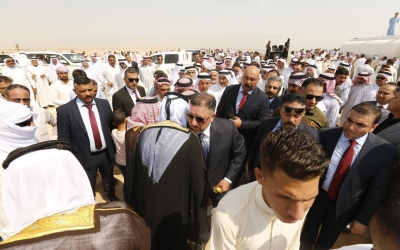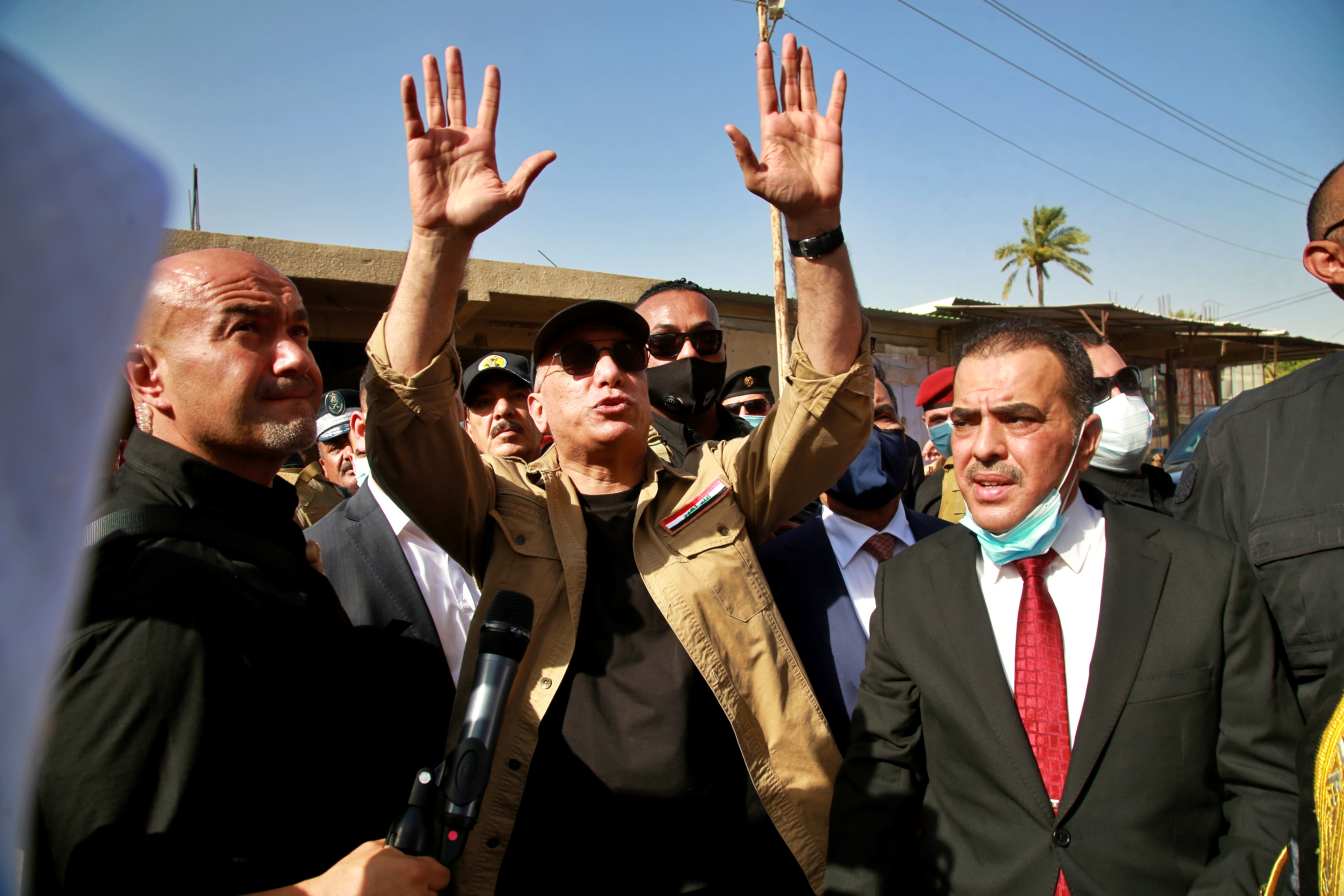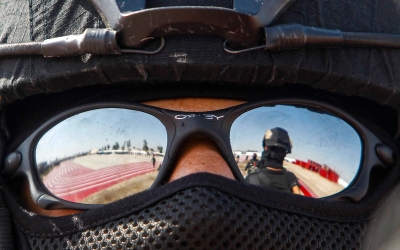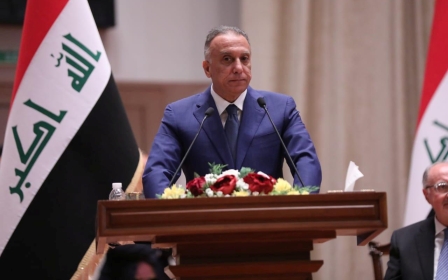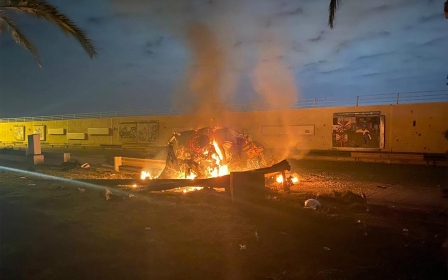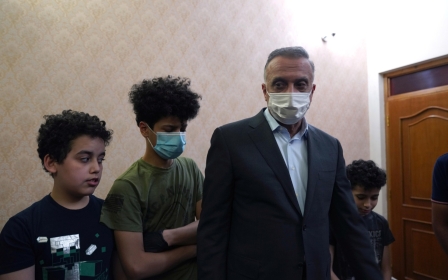How Iraq's Kadhimi used Iran visit to stake a claim for sovereignty
At first, Iraqi Prime Minister Mustafa al-Kadhimi's press conference with Iranian President Hassan Rouhani appeared to be routine.
The new premier stood in front of journalists in Tehran on Tuesday and acknowledged Iran's role in helping defeat the Islamic State group (IS), a common refrain from Iraqi leaders.
His next line, however, threw cold water on the proceedings.
'Reorganising the bonds of the relationship between Iraq and Iran, as a state versus a state, represents a real challenge for the Kadhimi government'
- Fadi al-Shimari, head of al-Hikma
"And that is why Iraq stood with the Islamic Republic to overcome its economic crisis and it turned into a market for Iranian products," Kadhimi said, and called for "full and comprehensive cooperation between the two countries" to ensure the continued exchange of services.
Linking economic assistance to Iran's assistance in fighting IS, and drawing lines between Baghdad and Tehran, signalled a dramatic shift in the official Iraqi discourse towards Iran in particular and Iraqi foreign policy in general.
New MEE newsletter: Jerusalem Dispatch
Sign up to get the latest insights and analysis on Israel-Palestine, alongside Turkey Unpacked and other MEE newsletters
This relationship, Kadhimi was saying, had to become one of equals.
"Reorganizing the bonds of the relationship between Iraq and Iran, as a state versus a state, represents a real challenge for the Kadhimi government," said Fadi al-Shimari, the head of al-Hikma, one of the biggest Shia parties supportive of the prime minister.
"Both countries currently have great opportunity to establish stability and respect the rules of the relationship in a balanced manner," he told Middle East Eye.
"A strong, stable, recovering and sovereign Iraq can play an important role in the Middle East at all levels, and Iran can benefit from this a lot."
Taking control
Seventeen years of competition between the United States, Iran and other regional players has caused havoc in Iraq and undermined its security, with each side sustaining influence through networks that penetrate all the governmental, legislative and judicial and security services.
Meanwhile, a series of wars, economic sanctions, neglect and corruption have paralysed the Iraqi economy and made it totally oil dependent.
Although Iraq is Opec's second-largest oil producer, since April the government has been unable to secure around $7bn needed monthly to cover the salaries for more than six million government employees, retirees and beneficiaries of social welfare networks due to the coronavirus and the sharp drop of oil prices, Iraqi officials told MEE.
Facing this economic crisis and limiting its repercussions on the Iraqi street is one of the most prominent challenges facing Kadhimi, which his opponents and allies are betting on to end or secure his political future.
Freeing Iraq from "the slavery of oil," as Kadhimi put it, and maximising state revenues is one of the premier's chief aims.
A part of his plan appears to be based on regaining control of border crossings and ports, and securing an attractive environment for foreign investment.
"Both goals necessarily mean limiting the control of armed factions and political and security leaders linked to international players in Iraq and the region," especially Iran, the US and Saudi Arabia, a senior Iraqi security official told MEE, speaking on condition of anonymity as he was not authorised to speak to media.
The border crossings in the south and east are under the complete control of Shia factions linked to Iran; in the north are held by two Kurdish parties, the Patriotic Union of Kurdistan and the Kurdistan Democratic Party, which are close to Iran and the US at the same time; and in the west are under relatively joint authority between Shia and Sunni forces linked to Tehran and Washington.
The Parliamentary Financial Committee estimates the annual revenues of these border crossings at no less than $16bn – with "less than $6bn reaching the Iraqi treasury," according to the official.
"The smuggling of weapons, hard currency and various goods takes place openly through these border crossings to and from Iraq, and what is not achieved through bribery is carried out with threats and intimidations," the official said.
Control of the border crossings can only come by developing understandings with neighbouring countries and local and regional players, according to the official.
"The keys are Iran and America, and this is what all Iraqi leaders, including Kadhimi, realise."
Upending arrangements
Restoring relations with Iran, the US and Saudi Arabia is an early attempt by Kadhimi to avoid an anticipated economic collapse and ward off the popular frenzy that would accompany the delay in millions of Iraqis' salaries.
Khadimi had been due to visit Saudi King Salman bin Abdulaziz on 20 July, but this meeting in Riyadh was postponed due to the hospitalisation of the king the night before for checks due to "an inflamation of the gall bladder," according to state news agency SPA.
Cancelling the visit to Saudi Arabia stirred up a lot of confusion in Iraq. Most Iraqi political forces questioned the news of the king's illness and indicated that the cancellation was instead due to Riyadh's refusal to receive any Iranian messages that Kadhimi would carry to them.
One of Kadhimi's advisers confirmed to MEE that the cancellation was "because of the deteriorating health of the Saudi King Salman bin Abdulaziz".
Iranian Foreign Minister Jawad Zarif had visited Baghdad and met with the prime minister just the day before.
Though Kadhimi's advisers did not explicitly say that the Iranian side had given any messages for the Saudis to the Iraqis, they implied that Iraq refused to play the role of mediator or postman.
"We want to defend our interests. We do not want to be part of the stampede in the region, and we do not want to play the mediating role, just as we do not want to be a postman because this is insulting," senior adviser Hosham Dawood told MEE.
According to Dawood, Iraq has been at pains to make clear to Iran, the US and Gulf Arab states that sovereignty means Baghdad being able to at once keep a distance but also a balanced relationship with all of them.
"Some want Iraq to play the role of the postman between Tehran and the capitals of the region and the world. This is a service role that Iraq, its prime minister, or even the Iraqis who demand to differentiate from others, especially Iran, do not accept," he said.
"As for mediation, it means prior acceptance of the mediator's sovereignty. Does Iran accept this?”
The Iraqi government's leverage with Iran is economic.
Severely debilitating US sanctions have left Iran's economy moribund and heavily reliant on next-door Iraq.
Tehran depends on its Iraqi allies to maintain its economic foothold in Iraq, by flooding the country with Iranian goods, preventing the establishment of any competitive industry or cultivation, smuggling hard currency, selling oil through Iraq's ports and facilities, and threatening and expelling foreign investors.
Such actions have been devastating for Iraq's economy in turn, and left the country vulnerable when oil prices plummeted earlier this year.
The trade exchange with Iran, meanwhile, has decreased by 40 percent over the past six months, according to government sources.
"Iran must decide which Iraq they want. Do they want a stable, economically recovering and financially strong Iraq, or do they want an Iraq ruled by warlords that will soon turn into a burden for Iran itself?" a prominent Shia politician close to Iran and familiar with the recent talks between Zarif, Kadhimi and Shia leaders told MEE.
"This is the essence of the current struggle in Iran between the institutions that Supreme Leader Ali al-Khamenei runs and the official institutions represented by the Supreme National Security Council," he added.
"In the end, the decision will be for the supreme leader, because his decision governs both parties, and all signs indicate that a strategic change is looming."
Frank discussions
Zarif’s visit, which seemed strange in its timing, was ostensibly aimed at "congratulating" Kadhimi on his rise to office and "showing high-level coordination" between the Iraqi and Iranian governments.
'Kadhimi was frank in his conversation with the Iranians. He said he understood Iran's interests and concerns, but also that the Iranians should understand that Iraq’s interests require diversification of its relations in the region and the world'
- Hosham Dawood, senior adviser
The first session included discussing the details of Kadhimi's upcoming visit to Tehran, and he was assured that he would be received with great hospitality as "a prime minister of a friendly country".
The reception would be an expression of full support for him and his government, and, to prove this, the supreme leader, "who has not met an official for six months except for one person, will receive him at his residence," Zarif said, according to the source.
What happened in the closed session is not clear, but it "revolved around what Iran wants from Iraq and what Iraq wants from Iran," the source said.
The Iranians want guarantees from Kadhimi that his government will not fully sever ties with Iran, pursue its allies or close Iraq's border to Iranian goods. They also want to ensure the continued flow of hard currency to it through Iraq and to raise the level of trade exchange to ensure that Iran remains a key partner in the Iraqi market, the Shia politician told MEE.
"Kadhimi was frank in his conversation with the Iranians," senior adviser Dawood said. "He said he understood Iran's interests and concerns, but also that the Iranians should understand that Iraq's interests require diversification of its relations in the region and the world.
"He can guarantee that Iraqi lands will not be the starting point for any aggression against Iran and that Iraq will not be part of any coalition against Iran. But he also needs security to maintain the Iraqi markets and attract foreign investors, and wants to ensure that the interests of the rest of his allies in Iraq are protected."
Dawood said the Iranians have the ability to significantly calm current tensions between Kadhimi's government and Iraq's Iran-backed armed factions.
"Both sides can do a lot for each other. If the Iranians want to get what they demand, they must stop the childish behaviour of some of their allies in Iraq," he said.
Differing versions
Events in Tehran 48 hours after the meeting with Zarif witnessed the exchange of many hidden messages between the two parties.
Kadhimi was not accompanied to Iran by any Iraqi officials known to be close to Iran, as is customary in similar visits by prime ministers, with the exception of Qasim al-Araji, national security adviser and leader of the Badr Organisation, the largest and oldest Shia armed faction backed by Iran.
Araji is known for his moderation and balanced relations with the US and Gulf states.
Kadhimi also carried protocol gifts with him to Khamenei, including a ring decorated with a large lobate of red agate, a rare and precious copy of the Quran and an embroidered abaya from Najaf.
The abaya, according to Dawood, was a show of independence, signalling that those wearing the abaya of Najaf are under the religious supervision of Sayyid Ali al-Sistani, Iraq's grand ayatollah, rather than Khamenei.
And while the Iranians were keen to show an "exaggerated" warm welcome to the prime minister and his accompanying delegation to give the impression "that the Saudis refused to receive Kadhimi, so the Iranians embraced him because they were his only refuge," he coolly responded by highlighting Iraqi economic assistance, according to one observer.
The Iranians were careful not to leak any audio or video recording of the meeting between Khamenei and Kadhimi. But three hours afterwards, they published a series of tweets from Khamenei's account in both Arabic and English purportedly part of the two men’s conversation.
Khamenei's tweets mostly berated the Iraqis for not taking revenge for top Iranian general Qassem Soleimani, who was killed by a US drone strike while their guest in Baghdad.
They also held them responsible for driving the Americans out of Iraq and ensuring that the US is treated as an enemy. The tweets portrayed Khamenei as guardian over Iraq and the Iraqis, while making it seem as if Kadhimi was listening without response.
"The Iranians wanted to say that the supreme leader is the one with the highest authority and his position is sacred and no one discusses what he says, which means that there is one speech and one voice, which is his voice and his speech," a senior Iraqi official close to Kadhimi told MEE.
"Whatever the message they wanted to deliver, it is addressed to their audience. For us, Iraq's formal position was said in front of the cameras."
The official said the Iraqi government sees the visit to Tehran as positive, and that the message Baghdad now has an independent prime minister with international support has been delivered.
"For them, the economy is the priority, and security is a priority for us. Ensuring that they get what they want necessarily means making a kind of harsh concession to return the deal between the two countries to state-to-state status," he said.
"If we get this, then this is the happy end."
Middle East Eye delivers independent and unrivalled coverage and analysis of the Middle East, North Africa and beyond. To learn more about republishing this content and the associated fees, please fill out this form. More about MEE can be found here.


